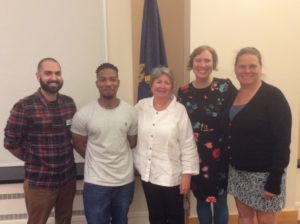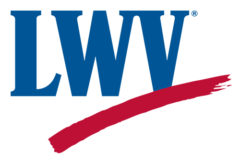Juvenile Justice: Are we improving outcomes for youth? Watch the recording of this forum.
Speakers:
Panelists (L to R) included Babak Zolfaghari-Azar, Family Care Manager, Community Healing Initiative Program; Kenny McGee, who spent 6 years in youth correctional facilities; moderator Doreen Binder, Kimberly McCullough, Policy Director for ACLU Oregon, , and DeAnna Horne, Oregon Criminal Defense Lawyers Association. They reviewed the impacts of Measure 11 on the juvenile justice system. Kenny also spoke about his experiences.
Measure 11 and the juvenile Justice System
According to Multnomah County information, “Oregon voters approved Ballot Measure 11 in November 1994 to apply mandatory minimum prison sentences to certain crimes against persons …, with no possibility for any reduction in sentence, such as for good behavior. Measure 11 also mandates that juveniles age 15 and older, charged with the felonies…be tried as adults.
Panelists told the stories of youth who are impacted by the juvenile justice system and described community responses that are shown to improve outcomes. The speakers discussed legislative remedies that they believe would improve the juvenile justice system, and they answered questions from the audience.
The League of Women Voters Civic Education programs are free and open to the public. MetroEast Community Media records these programs for rebroadcast and streaming on this website, lwvpdx.org. The Carol and Velma Saling Foundation and the Multnomah Bar Foundation provided grants to pay for the recordings

